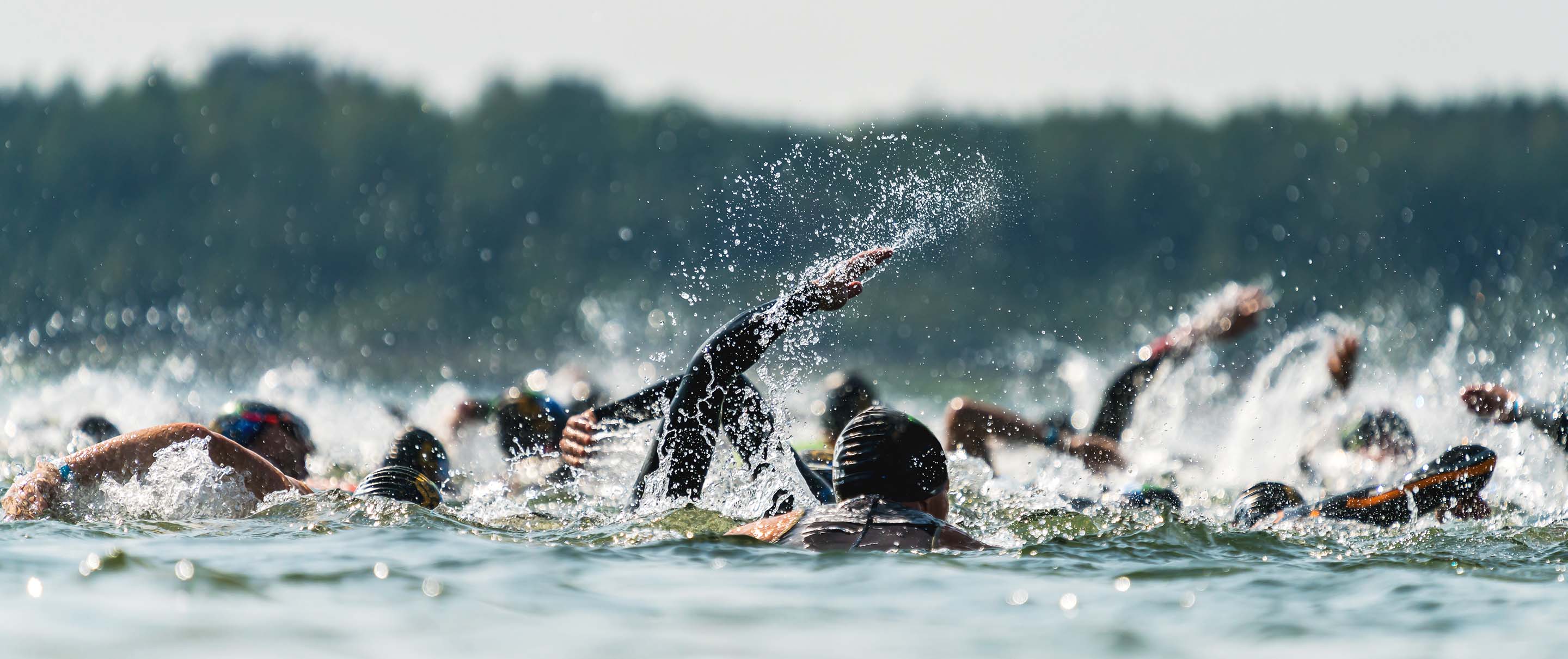Mind Over Matter: How Triathlete Adam Goulet Overcame Open Water Swim Anxiety
Whether you’re racing in your first triathlon or you’re a seasoned pro with years of experience, open water swimming can be an anxiety-filled experience.
And that anxiety isn’t always predictable—it can be triggered unexpectedly, derailing individual races as well as your long-term triathlon ambitions, even if it’s never been a challenge for you before.
That’s exactly what happened to Adam Goulet: after years of racing without a trace of anxiety, a single day changed everything—and he’s been proactively battling through it ever since.
We spoke with Adam to learn why his anxiety suddenly emerged, how he’s managed to overcome it and gone on to win multiple age group national championships, and what advice he would offer to anyone who wants to take control of and overcome open water swim anxiety.
FORM: Can you tell us a bit about your history in triathlon and how your open water anxiety unexpectedly emerged?
Adam Goulet: Absolutely. I had probably been doing triathlons for three or four years and I’d never had any sort of anxiety about swimming in open water. But it all of a sudden hit me during one specific race.
I was doing a race during a year when the water was particularly cold. And, during this race, there was a support boat moving alongside the swimmers.
They had a diesel engine and the exhaust fumes started to give me breathing issues. Between that and the cold water, it triggered a massive panic attack, and the next thing I knew, I was out of the water and my race was over.
I just had to get out.
Since that experience, you’ve continued racing in triathlons and have even gone on to win multiple age group national championships. How were you able to manage your anxiety in the years since then?
I think that happened back in 2015 and it’s taken proactive effort to overcome my open water swimming anxiety ever since.
First and foremost, I’ve found ways to get away from cold water races. Instead, I try to do races where I think the water will be warmer and more clear.
One of the most anxiety-inducing things about open water swimming is the lack of sensory input that comes with it.
Unlike a pool, swimming in open water is cold. The visibility is pretty much zero which eliminates your visual cues. You’re wearing a wetsuit, which adds a level of compression to your body, and you’re buoyant which removes your perception of balance. And it’s loud, which makes it hard to hear what’s going on around you.
So, you suddenly feel like you’re in a sensory deprivation chamber.
I’ve also started incorporating a mindfulness practice into my pre-race ritual. So, as I’m getting ready to go in the water, mentally I’m not there. I’m in my own mind, visualizing the race and getting myself relaxed.
Another thing I’ve found helpful is using my FORM goggles. Having my data displayed right in front of my eyes gives me something to focus on which helps put my mind at ease. It gets my brain online, takes my mind off the sensory deprivation, and gets me focused on what I’m supposed to be doing.
I know that’s not the primary purpose of the goggles, but it definitely helps me!
What advice would you give to anyone who experiences open water swimming anxiety? How can they prepare for it, and what can they do if they start to feel it during a race?
I think a lot of triathletes get open water swimming anxiety. It’s not uncommon, but it can really throw you off.
So, there are a few things I’d recommend to help prepare for it and overcome it.
• Be Selective With Your Races
Before you even start training, plan your race schedule accordingly. If you get anxiety while swimming in open water, try finding races where the water is clear and warm. That already gets you off to a positive start.
• Train for Open Water Swimming
If you have any opportunity to swim in open water during training, take it.
As triathletes, for the most part, we train in the pool. And, to me, that's kind of like putting a treadmill in a closet and running on that while you train for a marathon. In reality, you could probably still do it—but it’s not going to be the same as running outside.
So, get out into open water at every opportunity.
• Have a Mental Game Plan
If you know you have anxiety about open water, then a mental game plan is essential. It really helps to visualize every stroke through the water so you know how your swim is going to go.
So, try to think about every detail—what are you going to do when you're in the crowd waiting for your turn to get in the water? What have you done to warm up? How will you feel during the early stages of your swim—say, up to the first buoy? And, if you get anxiety in the water, what are the steps you’re going to take to alleviate some of that panic?
• Practice Mindfulness Before Getting Into the Water
As I said, I’ve started practicing mindfulness before getting into the water, and I really recommend that.
Try to be very present in the moment and to take control of your mindset. Get yourself calm and relaxed so that you carry that same feeling into the water.
• Don’t Be Afraid to Take a Break Mid-Swim
If you start to feel anxiety or panic coming on, be willing to stop and just chill for a minute.
It’s important to realize—especially in longer-distance races—that time isn’t a critical factor. It’s easy to worry about losing time in your race. But, in the grand scheme of things, taking 30 seconds during your swim to just bob in the water, catch your breath, and relax is no big deal.
If you need to stop, do that. If you need to backstroke, that’s totally fine too. It might even be a matter of swimming 300 meters and then taking a break before you get going again.
Whatever you need to do to calm down, take a minute to do that.
You can make up the time on the bike or during your run. But, even if you don’t, it’s better than the alternative—pulling out of the race.
• Give Yourself Some Space
For a lot of people, the experience of other people swimming around them causes serious anxiety.
So, it can be smart to swim out wide and find yourself some space to maneuver.
Whether you’re starting out wide and then working your way into the group or just finding yourself some space to calm down when you feel anxious before getting back into the mix, getting away from the chaos of being in the fray can help a lot with anxiety.
• Start Slow and Pick Up Your Pace Over Time
Most people go really hard right from the start of the swim.
And you can go sort of hard, but if you go too hard, you’re going to be burning matches. It’s going to affect your entire race.
Instead, start slow, get settled into the race, stay relaxed, and then pick up your pace as you get more comfortable in the water.
In order to avoid anxiety, it’s important to keep your breathing rate down. When you’re swimming, you're locked into a breathing rate—you can only breathe every stroke.
So, if you push harder, and you need to ventilate more often than you're taking strokes, you're going to be in trouble—that will definitely get your heart rate going and can induce some anxiety and panic.

What drove you to keep racing, even in the face of that adversity?
You know, it was actually the adversity itself that kept me going. It was irritating and it kind of put a chip on my shoulder to prove to myself that I could do it, even though my body was telling me to stop.
For me, it was actually the experience of not wanting to do it that made me want to do it.
I’m sure most triathletes would agree that there's some point during the open water swim leg of every race where you start to wonder why you’re doing it.
But, in the end, it’s always worthwhile. It’s just a matter of persevering and finding a way to achieve your goal.
Take Your Open Water Swimming to the Next Level
If you’re ready to supercharge your open water swimming, join now—FORM memberships include our worry-free, 30-day return guarantee.
Already have FORM goggles, but don’t have access to our full range of features? Head to the FORM app to start a 30-day free membership trial*.











